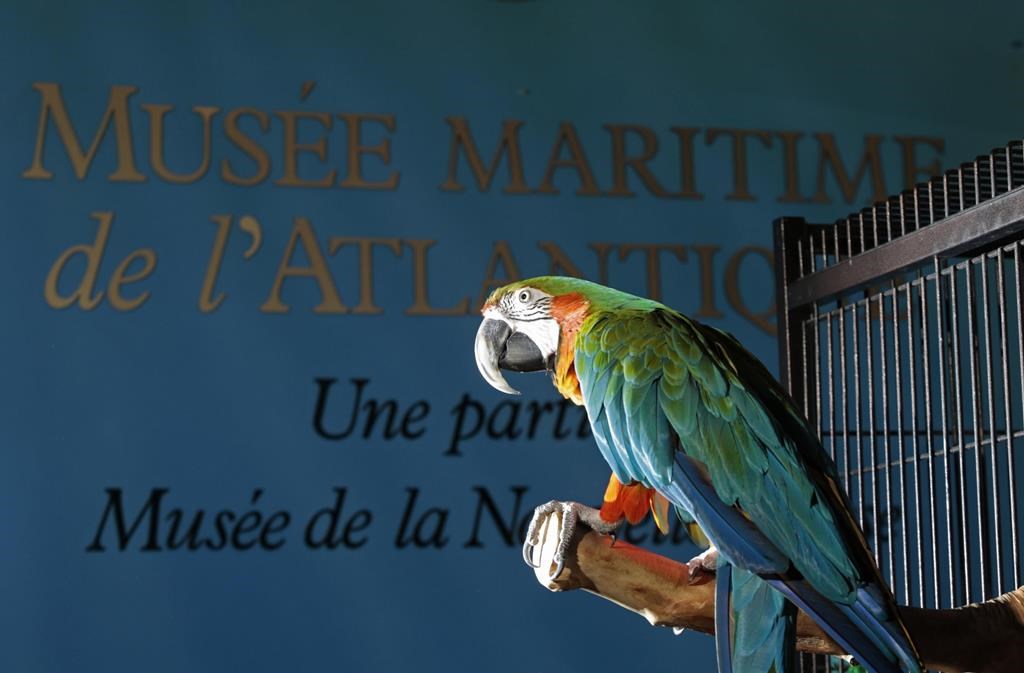HALIFAX — A parrot in Nova Scotia that has been showing signs of depression since the COVID-19 pandemic is moving to Ontario for a change of scenery and to make new friends.
Merlin has been the mascot of the Maritime Museum of the Atlantic in Halifax since 2006, but his routine was disrupted when COVID-19 emerged in 2020 and the museum closed.
Kim Reinhardt, general manager of the Maritime Museum of the Atlantic, said the lack of interaction with visitors led Merlin to bite his feathers, a sign of stress, and the behaviour continued even after museum operations fully resumed.
During a Zoom interview on Thursday, while snow fell outside the window, Merlin sat on his perch and preened his bluish-green feathers. He lifted his claw and rubbed his eye.
“Peek-a-boo,” he said, cocking his head and trying to catch Reinhardt’s eye. He went back to preening after she looked at him and replied: “peek-a-boo.”
The museum has a number of toys to keep the intelligent, active and social bird occupied, and a team of staff members spend time with Merlin, but Reinhardt said the company is not enough.
Twenty-two-year-old Merlin is “quite talkative,” with the words “cracker” and “peek-a-boo” part of his regular vocabulary, and despite his depression, he “laughs on a regular basis.”
Reinhardt said parrots like to have companionship with other birds. “We can’t provide that.”
So, after consultation with a veterinarian, it was decided that Merlin would leave Halifax on April 15 to join a flock of fellow macaws — large members of the parrot family — at Safari Niagara in Fort Erie, Ont.
Safari Niagara happened to be looking for another macaw, Reinhardt said, because there is one bird there that is currently single.
“So there’s hope that maybe Merlin will feel a special bond to the macaw that does not have a mate,” she said.
But introductions will have to be gradual because Merlin has not known or lived with his kind since he was born. He is a hybrid, rainbow macaw that was hatched in captivity, living the first few years of his life in a pet store.
“He’s never lived with other birds. He’s never flown. He’s never been taught to fly.”
The bird arrived in 2006 and took his place as the museum’s mascot.
“It seemed to be a great time to maybe introduce a mascot for the museum,” she said. “Other institutions sometimes have an animal mascot, and … macaws and parrots have links to maritime nautical history and heritage. It seemed like a great fit.”
Over his years at the museum, she said the bird was beloved — and spoiled.
“The veterinarian set us straight once he found out we were giving him way too many treats.”
Now, his diet includes broccoli, carrots, an assortment of fruits, a cracker or two and two peanuts.
On his perch, Merlin shredded the envelope of a goodbye card he was given. Museum staff took the card away to keep it safe from his beak, which he loves to use to tear paper.
Reinhardt said Merlin leaving will leave a large vacuum at the museum.
“We’re going to miss him so much. But we also love him so much and we just want the very best for him.”
The macaw is going to be put in a travel cage and flown to Ontario rather than be driven by car, which is not Merlin’s favourite mode of travel.
“We’ve heard him protest before and I can assure you it’s very loud.”
This report by The Canadian Press was first published April 4, 2024.
— By Hina Alam in Fredericton.


